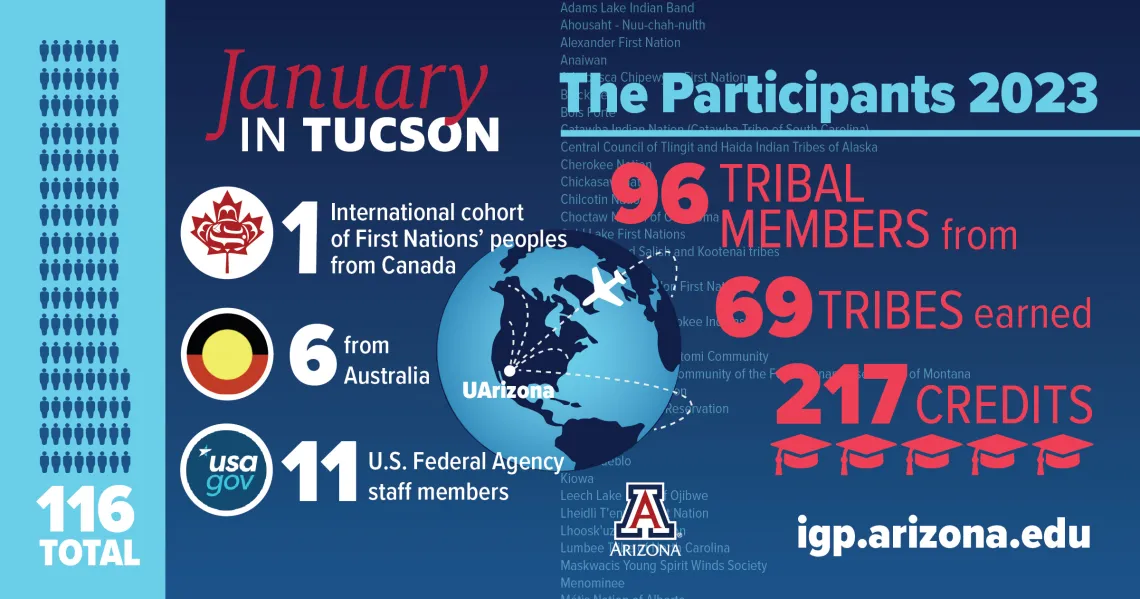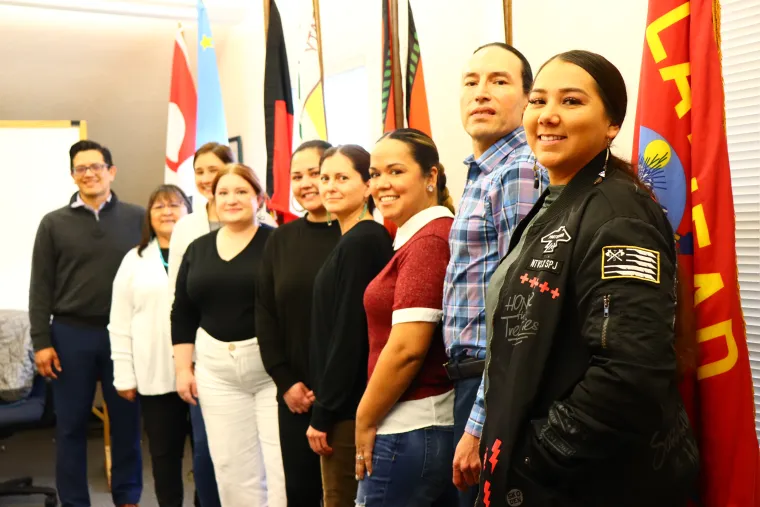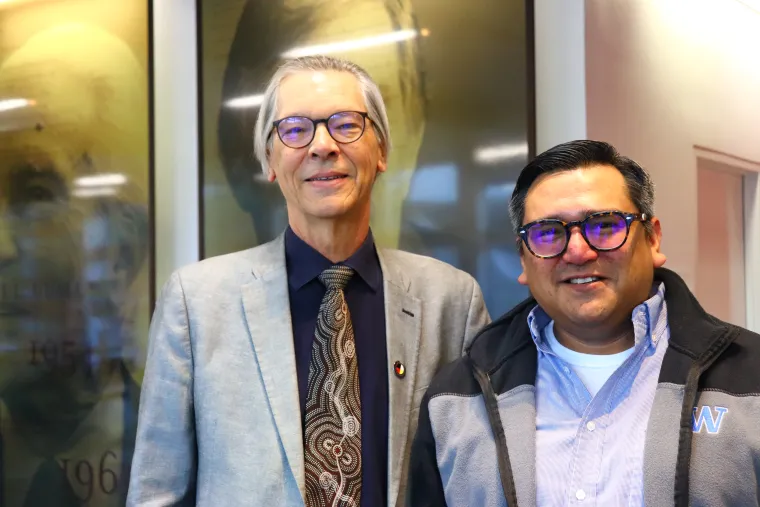Celebrating Our Largest January in Tucson Cohort Ever

As most UArizona students, faculty and staff are still adjusting to the idea of getting their noses back to the academic grindstone, the Indigenous Governance Program at the James E. Rogers College of Law hits the ground running at the start of each new year.
Founded in 2012 by the Native Nations Institute and the Indigenous Peoples’ Law and Policy Program, January in Tucson (JIT) provides the opportunity for students, Tribal professionals and community members to participate in accelerated, Master’s-level courses covering a variety of topics related to Indigenous sovereignty and Tribal governance over three weeks.
UArizona students can earn up to 12 graduate credits and a Graduate Certificate over the course of the program. Non-students can earn a Continuing Education Certificate in Indigenous Governance by completing a total of six three-day courses and CLE credits are available to legal professionals who attend.
Each year, JIT attracts dozens of students from around the world with an interest in learning how to further their understanding of Indigenous governance and improve their capacity to strengthen the sovereignty of Indigenous Nations and Peoples, along with a roster of expert instructors to show them the way to success.
JIT 2023 By the Numbers

The 2023 Tribal Professionals Cohort pose with NNI's Tribal and Direct Services team during JIT.
2023 marked the most successful JIT event in the program’s history in terms of attendance. In the first year in which the roster hit triple digits, UArizona hosted 116 students in 19 individual courses during the three-week program.
The cohort of students included:
- 79 enrolled Tribal members representing 56 individual Tribes/Native nations
- 42 Tribal professionals
- 18 graduate students
- 74 students from outside the state of Arizona
- 38 international students
The JIT faculty was equally diverse. Faculty members for this year’s program included:
- 23 expert instructors
- 17 enrolled Tribal members representing 13 individual Tribes/Native nations
- 11 UArizona faculty and staff members
- 4 international guest instructors from Australia and Canada
All told, the 2023 JIT cohort included representatives of more than 15 international government agencies, a half-dozen NGOs, several businesses and at least 12 international colleges.
The Student Experience

JIT student Callie Phillips (Cherokee) in the UArizona Law School courtyard.
For students engaged in Nation-building work or who intend to go into Nation-building work after graduating, the JIT experience provides myriad benefits not offered in traditional educational environments. Some of these benefits include small class sizes, the ability to concentrate on a single subject at a time over the course of a few days and the chance to network and connect with professionals and subject matter experts who attend both as instructors and as peers in the learning environment.
According to exit survey results, more than 95 percent of students who already engage in Nation-building work professionally or plan to do so in the future reported that JIT and the NNI would prove to be a “Very Important” or “Extremely Important” resource for them in carrying out that work.
Callie Phillips is a second-year law student in the Indigenous Peoples Law and Policy Program at the James E. Rogers College of Law. As a member of the Eastern Band of Cherokee Indians in Cherokee, North Carolina, Phillips is studying to earn dual law and master’s degrees in hopes of one day working in Tribal governance.
2023 was Phillips’ first experience learning in the JIT environment. She said that working closely with her professors and classmates in her JIT courses helped prepare her for life outside of the classroom. Says Phillips, “Overall I felt like (JIT) gave me a lot of skills that I can actually take to my Tribe or to other Tribal places that I may work… I feel like (it) really shined a light on the real world.”
Plus, she added, having direct access to such a wide variety of experienced professionals on both sides of the podium helped to broaden her understanding of what it’s like to work as a Tribal professional. “I found my classmates in January in Tucson were equally as beneficial as my professors,” Phillips says, “Everybody brought a good perspective to the class.”
Looking Ahead

UArizona Law Professor Robert William, Jr. (left) and Indigenous Governance Program Manager Tory Fodder pose in the law school lobby on opening day of JIT 2023.
Now that JIT 2023 is in the rearview mirror, organizers are already looking at how they can make next year’s program even better than the 11 that preceded it (though the program was founded in 2012, there was a one-year gap in the program’s institution in 2016).
Indigenous Governance Program Manager and JIT instructor Tory Fodder expressed his enthusiasm for the success of this year’s program. “We are obviously thrilled to have had such wide participation from Tribal leaders, students and professionals from all over the world,” Fodder said.
Fodder was also quick to share the credit for an event that went off more or less without a hitch. “We have a tremendous team that brings their many talents and skills to help make January in Tucson such a unique and meaningful experience,” he said, adding, “Hats off to our committed staff, faculty, and our partners in the Indigenous Peoples Law and Policy Program. We look forward to drawing from the feedback of our guests and hope to make #JIT2024 even better!”
As in previous years, you can expect JIT 2024 to feature new subjects of study, new expert lecturers and wide representation from Tribal and international governments, NGOs, businesses, and academic institutions around the world both on the student and faculty sides of the equation.
To stay in the know regarding registration for future JIT events, and to keep up-to-date on other goings-on at NNI, sign up for NNI’s bi-monthly newsletter here.

